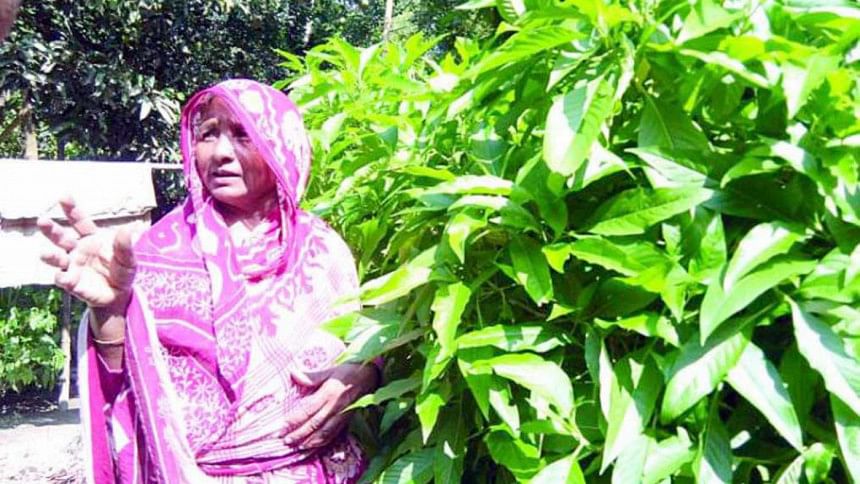Oushodhi Gram: village of herbs

Petbhata village in Rangpur is now known as Oushodhi Gram (village of herbs) as hundreds of families there are gaining solvency by planting herbs.
Recently, this correspondent visited the village in Pirgachha upazila when he saw almost all homesteads covered in greenery as the residents had planted different kinds of herbs there.
Ashok, Chirata, Korpur, Punorbhaba, Tejbal, Nageshwar, Arshgandha, Jyoti Pushpa, Gorakh Chakulia, Kutraj, Bashak, Kalomegh, Olat Kambal, Haritaki, Bahera, Arjun, Swarnalata, Tejpata are some of the herbs.
Seventeen years ago, a local herbal medicine practitioner (locally known as kobiraj) Abdul Jabbar planted herbs on his homestead for making medicines. He took the initiative after getting training from different local NGOs.
Abdul said he had a vision of making the villagers self-reliant. To materialise that, he started campaigning door to door to inspire the villagers plant herbs on their homesteads.
He initially trained 12 poor farmers of the village and explained the medicinal benefits of herbs to them.
“I myself gathered the herb saplings and planted them on their homesteads. Over the next five years, many villagers became interested and took up herb farming,” said Abdul. “Now you cannot find a single home that has no herb plant. The villagers are enjoying the additional earnings as well.”
At present, 300 families in Petbhata have herb gardens on their homesteads. Abdul and his wife Saleha Begum collect leaves and creepers from the villagers and supply those to herbal medicine factories in Rangpur and Dhaka.
The couple earns Tk 10,000 to 12,000 per month while the growers earn Tk 3,000 to 5,000 per month by selling the leaves and creepers.
Abdul collects 12-15 maund of herb leaves and creepers from the growers every month.
The rates for leaves are Tk 60 per kg for Shatomul, Tk 50 for Tulsi, Tk 40 for Bashak, Tk 120 for a kg of Kalomegh and Tk 400 for a maund of Olat Kambol and Haritaki.
Prices of Bahera, Arjun, Swarnalata, Tejpata, Bosh usually fluctuate, according to Abdul.
“My house stands on five decimals land. Instead of keeping some parts bare and unused, I planted various herbs there. I now earn Tk 3,000 to 4,000 every month from my garden,” said Ayesha Begum, a homemaker.
Solaiman Ali grows herbs alongside cultivating paddy and other crops. “It generates extra income for me. Unlike other crops, it hardly requires any cost for production. Moreover, herbs can be grown round the year.”
Pirgachha Upazila Agriculture Officer Shaminur Rahman said herbs are in great demand as those are crucial ingredients for production of medicines.
The people of Petbhata village have now become solvent by herb farming as they are getting supplementary income and more people should follow suit, he also said.

 For all latest news, follow The Daily Star's Google News channel.
For all latest news, follow The Daily Star's Google News channel. 



Comments